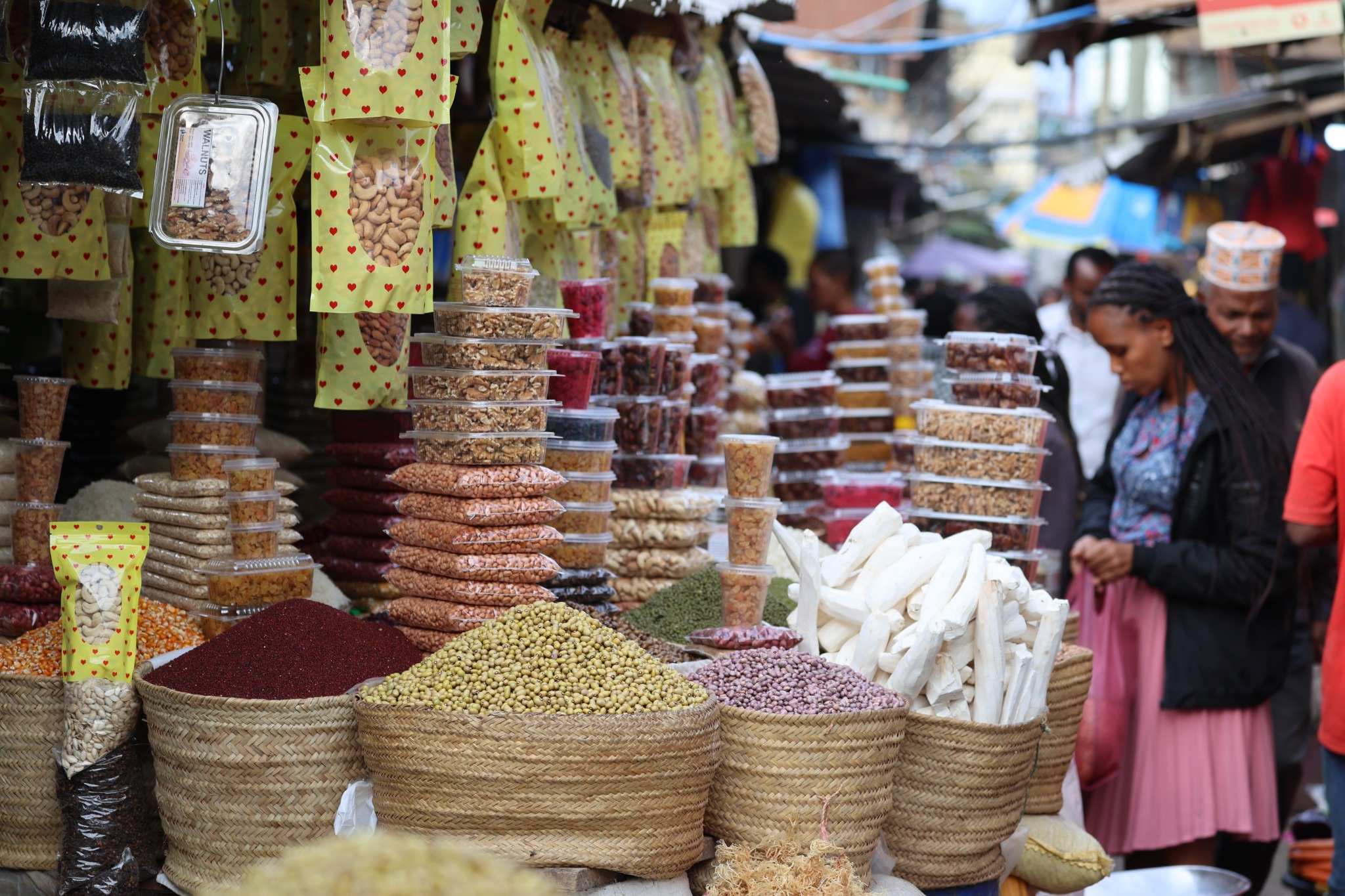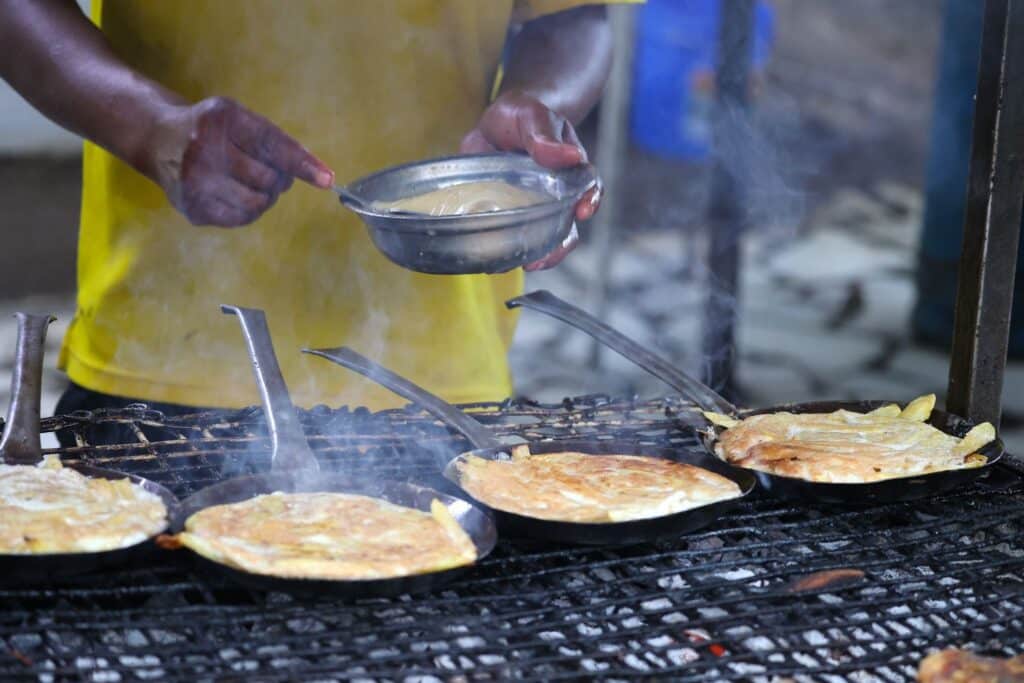Tanzania food: sensations along your safari journey

When considering Tanzania, it’s easy to picture endless landscapes, lions and savannah wildlife running free, breathtaking parks, and unforgettable colors.
But there’s another side of the journey. One that’s gaining popularity thanks to social media, accompanying travelers at every step: the food.
Vibrant, fragrant, and flavorful spices are just the beginning. In Tanzania, traditional dishes are often enjoyed under a sky full of stars, surrounded by nature—turning every meal into an experience. The Tanzanian hospitality and food offer a journey within the journey. It’s a sensory path that forever ties flavors and scents to emotions and memories.
This blog will take you through Tanzania one bite at a time because a beautiful trip always begins with what nourishes your body and soul.
Awakening your senses: the experience of Tanzanian food
A safari in Tanzania offers unique experiences that often become journeys into the country’s rich culinary culture. Traditional dishes served in breathtaking settings awaken your senses with bold flavors, aromas, and textures waiting to be discovered.
Picture a dinner under the stars in the Serengeti, the iconic national park the Maasai call “the land that never ends.”
Immerse yourself in local life at vibrant markets like Darajani Market in Stone Town, Zanzibar.
Let your eyes and nose feast on the vivid colors and scents of spices, fruits, and vegetables. If you’re eager to go deeper, join a traditional cooking class.
Start by harvesting ingredients on a spice farm, then prepare local dishes like fish curry and pilau, a fragrant basmati rice dish with Indian roots, often served with meat or vegetables.
These hands-on culinary experiences do more than teach recipes. They offer a window into Tanzanian traditions and everyday life, creating meaningful, lasting memories.
They enrich your journey, turning it into a multisensory adventure!
The Tanzanian food scene: a patchwork of experiences
Tanzanian cuisine reflects the country’s diverse culture and landscapes.
From the spice-laden coasts to the bold, hearty flavors of the highlands, each region showcases its own culinary identity. Get ready to explore a delicious cross-section of Tanzania, where every dish tells a story.
Let’s take a closer look at the unique flavors that define each region of this culinary journey across Tanzania.
Flavors of the coast: Zanzibar and Swahili cuisine
The coastal regions, especially Zanzibar, are a paradise for the senses. Cinnamon, cloves, and vanilla—some of the finest aromas—fill the air and enhance every dish.
Coconut milk-based curries and pilau rice are among the most iconic specialties and pillars of Swahili cuisine.
How could we not mention Zanzibar pizza? A delightful twist on the classic Italian dish, it starts with stuffing a small ball of dough with your favorite toppings and cooking it like a crêpe.
You should also try Boku Boku, a traditional dish for special occasions. It is a stew cooked twice: first in water with spices, then in a sauce made from the cooking liquid mixed with whole wheat.
Equally famous is Pweza wa nazi, which in Swahili means “octopus with coconut.” This flavorful dish features octopus simmered in coconut milk with curry, cinnamon, cardamom, garlic, and lime juice.
Taking a guided tour through the bustling stalls of Stone Town’s market adds an extra layer to your journey. It will turn a simple walk into a rich cultural and sensory adventure.
Northern safari circuit: Arusha, Kilimanjaro, and Serengeti
The Northern Circuit is home to some of Tanzania’s most iconic destinations, including the Serengeti, the Ngorongoro Crater, and Mount Kilimanjaro.
These are places where food tells stories of tradition and authenticity. The flavors are bold and the dishes hearty, perfectly in tune with the wild spirit of a safari.
Among the most emblematic dishes are Nyama Choma (grilled meat, often served with Ugali, a kind of maize porridge) and Sukuma Wiki, a sautéed green vegetable dish that’s simple yet full of flavor.
Kilimanjaro coffee is also renowned: whether sipped after a hike or enjoyed while simply taking in the view, it becomes a signature flavor of the region.
You can learn more about this in our blog on the best time to climb Kilimanjaro.
And of course, there’s the magic of dining outdoors. Imagine starting your day with breakfast overlooking the Serengeti’s vast plains, enjoying dinner under the stars at Ngorongoro Crater, or having a picnic while gazing at the majestic Kilimanjaro.
Moments like these turn every meal into an unforgettable part of your adventure.
Off-the-beaten-track: central Tanzania and rural delicacies
In the heart of Tanzania, there are places often overlooked by travelers, yet they hold a culinary world made of honest, authentic, and unspoiled flavors.
As you journey through central Tanzania, you can taste Makande, a traditional vegetarian dish with maize and stewed beans.
Try Mtori, a rich and creamy soup made from green bananas and meat.
Visiting Tanzania’s most remote villages and sampling their cuisine, prepared exclusively with local ingredients and traditional methods, bridges cultural gaps. It offers a simple yet powerful insight into the history and roots of its people.
Street food experiences: Tanzanian markets and snacks
If you’re planning a safari in Tanzania, street food is a must. Don’t miss it!
Whether you’re strolling through the bustling alleys of Stone Town or exploring its colorful markets filled with the rich aroma of spices, a street food stop is absolutely essential.
Fresh, hearty, and simply delicious, Tanzanian street food is worth trying any time of year.
Here’s a quick guide to some of the top local bites you won’t want to miss:
- Chapati wraps: inspired by Indian cuisine, these golden, soft flatbreads are filled with spiced vegetables, meat, or eggs. Easy to enjoy on the go, and packed with bold flavors.
- Chipsi mayai: beloved local lunch dish made with French fries and beaten eggs. Satisfying, savory, and perfect to fuel a day of adventure. Chipsi mayai can be found both on local and tourist restaurants. Definitely something to try out!
- Mishkaki: skewers of marinated meat, grilled slowly over charcoal. Crispy on the outside, tender on the inside. It’s best served with spicy sauce and a squeeze of fresh lemon.
- Mandazi: sweet, fluffy fried pastries similar to American doughnuts, but often with a hint of coconut or cardamom. If you’ve got a sweet tooth, you’ll be hooked.
You should also try Spice Cake, one of the most popular local desserts. It’s a moist, spiced cake flavored with cinnamon, cloves, nutmeg, and chocolate.
And don’t miss the Date Bread, of Arab origin, made with dates, hazelnuts, eggs, and a generous amount of vanilla.

Tanzanian drinks: quenching your thirst
Tanzania is full of fresh fruit juices: mango, pineapple, papaya, and tamarind are among the most popular.
Alongside these, you’ll also find traditional non-alcoholic fermented drinks like Mtindi and Mando, both milk-based and similar to yogurt. Sip them the local way, with a straw, straight from the container.
Don’t miss the country’s national soft drink, Tangawizi, a Tanzanian take on a bold and flavorful ginger ale.
In some villages, you might find Mbege—a traditional fermented drink made from millet and maize—served during special celebrations. It is produced only by the Chagga tribe in Kilimanjaro area, where you can easily find it. Elsewhere it's not impossibile, but rare.
African tea, especially the chai version, is a must-try: spiced black tea brewed with milk, sugar, and warming spices like cardamom, cinnamon, and ginger.
As mentioned earlier, you absolutely should try Kilimanjaro coffee. It's one of the finest in Africa. Aromatic and full-bodied, it offers rich notes of spice and fruit.
Last but not least, if you’re strolling through the bustling market streets, taste the freshly pressed sugarcane juice. Sweet and refreshing, it’s made on the spot by squeezing fresh sugarcane and is sometimes served with ginger or lemon for a spicy twist. It’s the perfect pick-me-up in the tropical heat!
What is the most popular food in Tanzania?
One of the most popular and beloved dishes in Tanzania is Ugali, a dense, dough-like porridge made from maize flour and water.
It’s a staple across the country and is often served as a side dish with vegetables, beans, stews, or grilled meat such as Nyama Choma.
Ugali isn’t just food, it’s part of the Tanzanian identity.
Eaten with the hands and shared with family or community, it symbolizes togetherness and tradition.
Taste meets tradition: a culinary safari experience
Food is a powerful gateway to culture everywhere, and also in Tanzania, it opens the door to rich traditions and ancestral stories that are best discovered firsthand.
Go beyond the safari and immerse yourself in a multisensory adventure made of stories, landscapes, aromas, and authentic flavors.
Zohar African Safaris offers tailor-made itineraries that blend wildlife adventures with authentic culinary experiences. Packages include market visits, cooking classes, and traditional meals.
The Tanzania Family Safari – 9 Days combines safari activities with cultural encounters, including time with the Maasai and their food traditions. An ideal choice for travelers eager to explore Tanzania through both nature and flavor.
Savor the journey, one flavor at a time.
